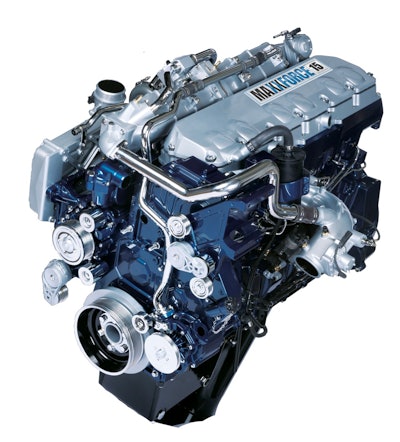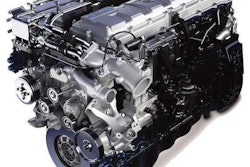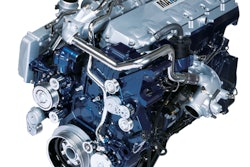 Navistar’s MaxxForce 15
Navistar’s MaxxForce 15A class-action lawsuit filed July 10 by three trucking companies against Navistar-International echoes claims of similar lawsuits filed this week: The truck and engine maker knew its EGR-only MaxxForce engines had defects and Navistar concealed those problems from buyers.
The suit, brought by carriers Denis Gray Trucking, Carmichael Leasing and GTL Enterprises, also claim Navistar failed to properly repair the engines during the warranty period, thereby decreasing their trucks’ value and shortening the expected life of the engine. Those who bought International trucks with MaxxForce engines “did not get what they paid for,” the lawsuit alleges.
Navistar spokesperson Elissa Mauer said earlier this week the company does not comment on pending litigation.
The class members in the suit include anyone who bought an EGR-only MaxxForce-equipped International between 2008 and 2013.
The engines could not “handle the amount of heat and pressure they generate,” the carriers claim in their suit, which led to issues like broken EGR valves, exhaust leaks that harm other parts of the engine and EGR cooler failures. The latter causes the engine to shut down immediately, the suit says.
The alleged defects, which the lawsuit claims stem from the exhaust gas recirculation systems on the engines, were safety hazards for both drivers and other motorists, as “sudden breakdowns” would force the trucks’ drivers to perform “emergency maneuvers” to get the truck off of the road. And the engine issues caused coolant and exhaust fumes to enter the cab, causing potential for driver poisoning, the lawsuit claims.

As with lawsuits filed earlier this week over the company’s 2011 and 2012 engines, the class-action suit claims Navistar knew the EGR systems on the MaxxForce engines had problems yet hid those issues from truck buyers.
As evidence of the alleged concealment, the lawsuit notes Navistar marketing that pushed its Advanced EGR system, its fuel economy and its resale value while calling selective catalytic reduction (the aftertreatment system used at that point by all other North American manufacturers) a technology that would be abandoned.
The suits also point to confidential witness testimony in lawsuits claiming Navistar violated securities laws, who say chief engineers in the company presented to former Navistar President and CEO Dan Ustian their concerns with the engines but the company proceeded with them anyhow. Engineers for the company also told their supervisors that the level of EGR the company wanted — along with its fuel economy and performance parameters — “was not possible” per the “physics of EGR,” according to the lawsuit.
The company also halted any work on SCR as a fall-back and threatened to fire employees who discussed “alternate solutions to…EGR,” the lawsuit claims.
Denis Gray Trucking — who’s based in Payullup, Wash., but purchased the trucks in California — says it has purchased more than 100 International trucks since 1977, including six between 2010 and 2012, which were powered by MaxxForce 13 Advanced EGR engines. The trucks had “consistent failures of EGR-related components,” the lawsuit says, with nearly all of the engines’ EGR coolers failing and needing replaced with the first 150,000 miles, Gray says int he suit. One didn’t make it 7,000 miles before the EGR cooler failed, the suit says.
Carmichael, based in Chicago, Ill., owns 31 2011-2013 trucks with MaxxForce engines and “experienced numerous breakdowns…most related to the emissions system,” the suit says, and even after repairs, the issues continued. Navistar dealers told Carmichael that the 2011 and 2012 engines did not have the same defect earlier models had.
Carmichael has seen losses of revenue caused by inoperable trucks, costs to fix the engines, costs in providing replacement trucks to customers and “substantially lower trade in and resale values…because the problems with the engines are widely known and feared in the industry,” the lawsuit claims.
GTL, based in Othello, Wash., owns 14 International trucks powered by Advanced EGR MaxxForce engines. Due to repeated repairs, it says, specifically on the EGR system, the carrier estimates it has lost more than 150 days’ revenue due to downtime.
The counts against Navistar in the lawsuit include breach of express and implied warranties and merchantability, breach of implied covenant of good fait and fair dealing, negligent misrepresentation, fraudulent concealment, unjust enrichment, violation of consumer fraud and deceptive trade acts and violation of unfair competition laws.
The lawsuits seek compensatory damages for the class, along with exemplary and punitive damages, attorney’s fees and court costs.
The suit also requests a jury for the case.
In late 2012, Navistar announced it would be transitioning away from its EGR-only approach and adding SCR systems to its 11- and 13-liter engines. It cut production of its 15-liter engine entirely and now offers Cummins ISX15 as its 15-liter option.
The company’s bottom line has also taken a hit from warranty claims from its 2010-2012 engines, reporting net losses of $898 million in 2013 and $3 billion in 2014.










